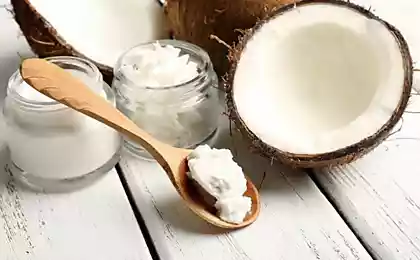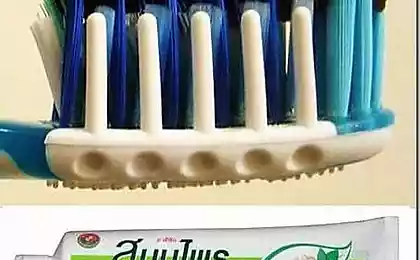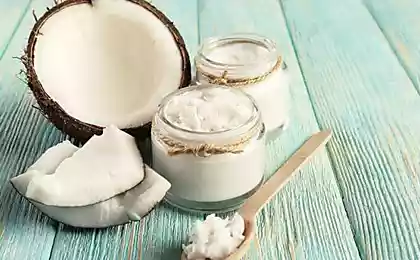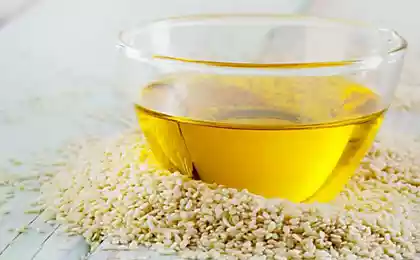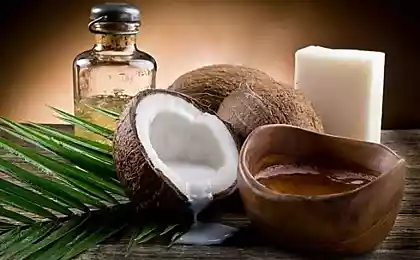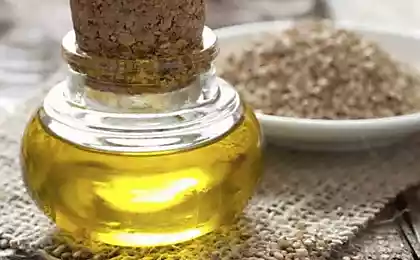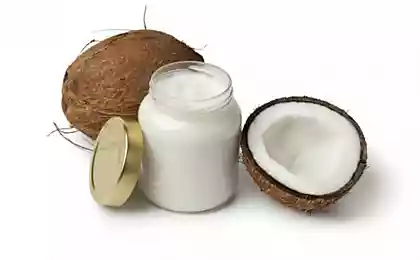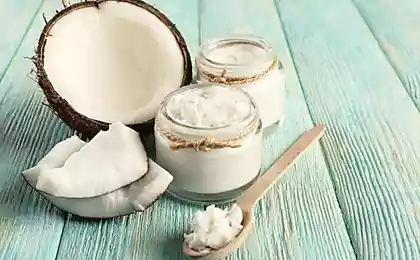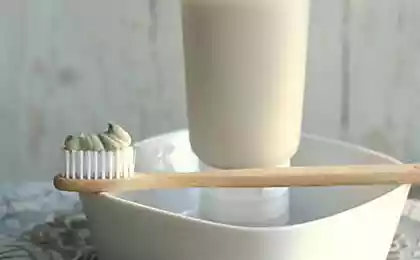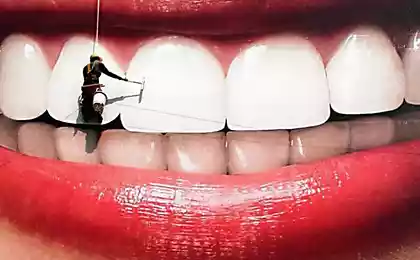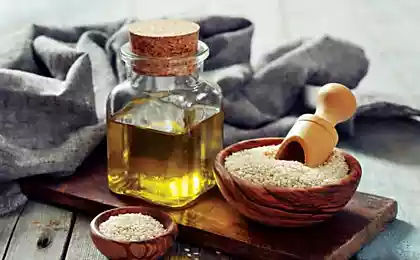756
Countless ways to use coconut oil: simple, strange and absolutely incredible
Thousands of years coconut oil was a staple food and self-care. It effectively kills all kinds of microbes, from viruses and bacteria to protozoa, many of which can be harmful and provides your body with high quality fat, essential for optimum health.
About 50 percent of the fat in coconut oil is presented in lauric acidwhich is rarely found in nature. In fact, coconut oil contains more lauric acid than any other substance on Earth.
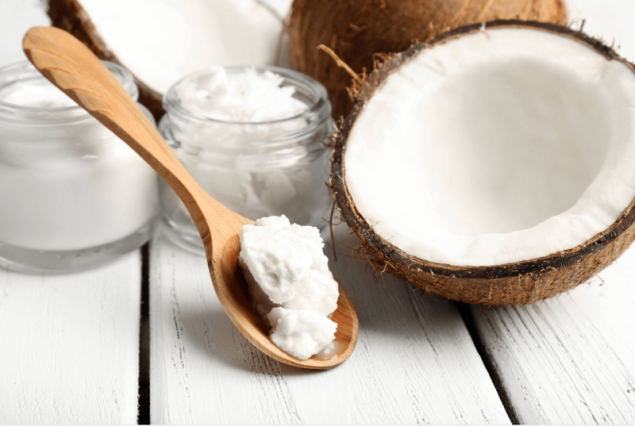
In the body lauric acid converts into monolaurin — a monoglyceride, which are proven to some extent effective against antibiotic resistant staphylococci and streptococci.
Coconut oil also has antifungal and virucidal action against some viruses such as HIV and herpes, influenza, measles, gram-negative bacteria and protozoa such as Giardia intestinal.
Coconut oil consists of medium chain fatty acids (MCFAs) that are easily digested and penetrate cell membranes. MCFAs are immediately converted by the liver into energy instead of being stored as fat. This is partly why I recommend coconut oil as ideal replacement for non-plant carbohydrates.
Coconut oil does not burden the digestive system and leads to the release of insulin in the blood, so that quick energy boost, you can just eat a spoonful of coconut oil or add it to food.
To include in the diet more coconut oil, you can add it to tea or coffee instead of sweetener. It also improves the absorption of fat-soluble vitamins, so daily consumption of vitamins with a spoonful of coconut oil will help strengthen them.
The overall health properties of coconut oil
Coconut oil can replace dozens of beauty products and products to care for themselves
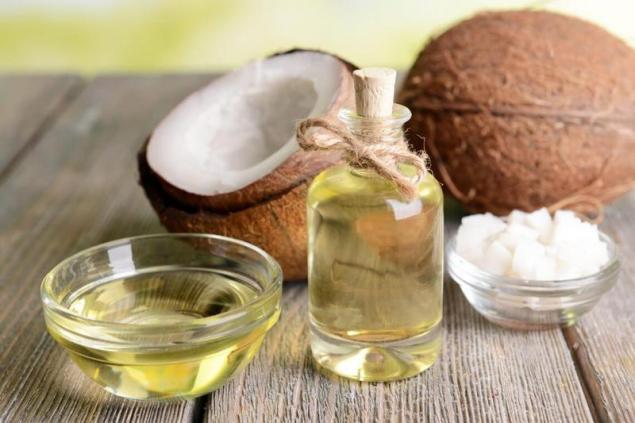
The recipes are hand-made from coconut oil means for skin care
Makeup remover: wipe with a cotton swab moistened with oil. Wipe clean with a cotton swab or damp cloth. Cleanser for the face: massage generously apply coconut oil on the skin of the face and neck. Rinse with a damp cloth and blot. Body scrub: in a glass jar mix equal parts coconut oil with organic cane sugar. Apply the scrub on dry skin before showering or bathing. Facial scrub: for a gentle facial scrub instead of sugar mix coconut oil with baking soda or oats and a pinch of cinnamon. Shaving lotion: apply a thin layer of coconut oil in place of shaving and shave as usual. Lauric acid in coconut oil will serve as antiseptic for cuts from shaving. Moisturizer for face and body: you can use it by itself or add your favorite essential oil. (Be careful to use essential oil of high quality, safe for local use.) Eye cream: apply a thin layer of coconut oil around the eyes to soften wrinkles and combat the thinning and sagging skin. Cream cuticle cream: simply RUB a little coconut oil around cuticles to soften dry areas. Deodorant: apply a little coconut oil directly onto your armpits – this will help fight odor due to the antibacterial properties of the oil. If you want, you can add a little baking soda or prepare a homemade deodorant of coconut oil, baking soda and arrowroot powder. Bath: add coconut oil to water for bath can help moisturize dry, irritated skin (Just don't forget after that to clean the tub, then to her not to slip!). Make sure that the temperature of the water was at least 24 degrees Celsius, and the oil will harden. Soap: coconut oil is one of the basic ingredients of many recipes homemade soap, for example, like this – NourishingJoy.com. Lip balm: you can just put on the lips a little coconut oil or make your own lip balm using coconut oil as one of the basic components. In the Internet you can find many recipes, but here's one that offers a resource "The Liberated Kitchen" ("the Liberated kitchen"). Toothpaste: mixed with baking soda coconut oil can replace your regular toothpaste. Soda gently cleanse, and antibacterial action of coconut oil will help to cope with the harmful bacteria. Best friend hair
Coconut oil is also known for its beneficial effects on hair. Most women prefer to apply it as a conditioner before using shampoo. Just apply coconut oil and massage gently on dry hair and leave for an hour or longer. You can even at night. Wear a shower cap to avoid staining the pillow. Then wash and style hair as usual.
Applied in such a way, coconut oil inhibits the penetration of water into the hair strands. If this happens, the cuticle, or surface of the hair shaft, rises, causing hair to be prone to damage and breakage. In addition, if you apply oil before shampooing, it will penetrate deeper into the hair during washing, when a little swell the fiber of the hair.
Use for mouth cavity
Coconut oil mixed with baking soda is a very simple, inexpensive yet effective toothpaste. It is also a great alternative if you need a toothpaste without fluoride, but you don't want to spend the extra money because these pastes are usually more expensive than usual, naturally.
Another method of care for the oral cavity, where, in my opinion, very useful coconut oil is rinse oil. This method significantly reduced the accumulation of my plaque, so I rarely go to the hygienist. (Adding fermented vegetables to diet is another factor that significantly changed the situation with the health of my oral cavity).
Rinse oil – millennial practice which emerged in Ayurvedic medicine. When it is combined with the antimicrobial power of coconut oil, I think it turns out very effective way of healing.
Traditionally recommended sesame oil, but there's a relatively high concentration of omega-6 fats. Therefore, I believe that coconut oil is much better, in my opinion, tastier. But from a mechanical and biophysical point of view, both are effective.
Oil rinsing involves rinsing the mouth with oil in exactly the same way as, for example, a dental elixir. You need to pull, push and pass the oil through the teeth for 15 minutes. If you are a fan like me, and want to achieve even better results, you can rinse for 30-45 minutes.
During this process, the oil "pulls" bacteria, viruses, fungi and other debris. This is best done in the morning before Breakfast, but you can at any other time. I try to do it twice a day if schedule allows. When you are finished, spit the oil and rinse mouth with water. Try not to swallow the oil, because it will be full of bacteria, various toxins, and debris.
If done correctly, the rinse oil has a significant cleansing, detoxifying and healing effect not only in the mouth and sinuses, but also throughout the body. As a rule, in the mouth is inhabited by yeasts and the streptococci — they and their toxic wastes can contribute to the accumulation of plaque and development of dental caries.
In addition to combat secondary infections and chronic inflammation throughout the body, rinse the oil will help reduce the toxic load on the immune systemby preventing the spread of these organisms from the oral cavity to the rest of the body through the blood.
Coconut oil for salvation
Ear infections: put a few drops in each ear canal. If coconut oil is hardened, it can easily melt, by placing a small amount in a shot glass or other small container and placing in a Cup of hot water Rash and irritation on the skin,includingchicken pox and shingles: simply apply a little to affected area of Fungal and/or yeast infectionssuch as athlete's foot and ringworm. For fungal infections, mix with a small amount of oregano oil or tea tree insect Bites and beeFever on lips: mix in a small amount with oregano oil and apply at the first sign Often bleeding from the nose: will help the regular application of a small amount of oil on the inner surface of the nostrils ThrushHemorrhoids: for extra healing power you can add a small amount of lavender essential oil vaginal Drynessperineal Massage: pregnant women can use it to massage the perineum daily, starting about a month before the birth, to reduce the chance of gaps and/or need for episiotomy Coconut oil more effectively from lice than permethrin
According to the study, published in "European journal of Pediatrics", found that a combination of coconut oil and anise almost twice as effective usually prescribed permethrin lotion to combat head lice. According to the authors:
"We conducted a randomized, controlled, parallel group study, a study involving 100 participants with active head lice infestation to investigate the activity of a coconut and anise spray, and to test whether the effect of permethrin lotion, applying it twice, with a difference in 9 days.
The spray was significantly more successful (41/50, 82,0%) compared with permethrin (21/50, at 42.0% ...). Protocol success was 83.3% and 44.7%, respectively. Thirty-three people reported reactions irritations after contact of the alcohol with flaky skin.
We concluded that although permethrin lotion is still effective for some people, the spray coconut and anise can be significantly more effective alternative treatment."
Isn't it wonderful that nature provides us with so many effective solutions to many of our troubles? And does it is often much more effective than a concoction of chemicals!
Hawaii lice treat even more fun: the hair is first moistened by vinegar and leave to dry (do not rinse). Then apply coconut oil at night. I would recommend to sleep in a shower cap so as not to stain the bed. They say that on the following day the nits easily combed.
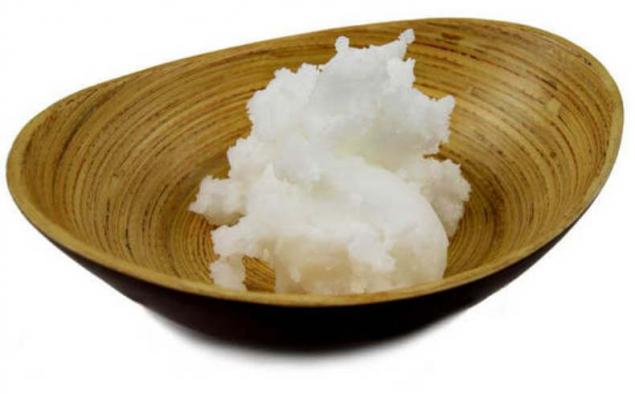
14 amazing uses of coconut oil in everyday life
1. Clean, condition and sanitize wooden cutting Board. Use whenever the wood begins to look dry. 2. Add to a solution of garden compost to reduce foam. 3. Use for polishing metal products. First try on a small area. 4. Moisturize and soften leather goods, as well as other skin products. 5. Grease the cast-iron pots and pans instead of lard or corn oil. 6. Lubricate squeaky hinges and broken mechanisms instead of WD-40. 7. To clean and refresh your wooden furniture is polishing. Don't forget to first try on a small area. 8. To lubricate guitar strings. 9. Clean the lather from the shower (put a little coconut oil on a damp cloth). Sprinkle stains with white vinegar and wipe dry with a lint-free cloth.
10. Wash arms and hands after working with oil paints instead of chemical solvents.
11. To clean and freshen the car interior (apply a small amount on a soft, lint-free cloth, RUB and remove).
12. To clean and disinfect the mouthpiece, causing a thin layer of coconut oil. To leave the oil on it when not in use. Rinse before use.
13. To clean and add Shine to indoor plants by wiping the leaves with a lint-free cloth with a small amount of coconut oil.
14. To remove chewing gum from almost anywhere, including carpets and hair.
published by Dr. Joseph Mercola Materials are for informational purposes. Remember, self-life-threatening, for advice regarding the use of any medicines and methods of treatment, contact your doctor. P. S. And remember, only by changing their consumption — together we change the world! ©
Source: russian.mercola.com/sites/articles/archive/2017/02/03/%D0%BA%D0%BE%D0%BA%D0%BE%D1%81%D0%BE%D0%B2%D0%BE%D0%B3%D0%BE-%D0%BC%D0%B0%D1%81%D0%BB%D0%B0.aspx
About 50 percent of the fat in coconut oil is presented in lauric acidwhich is rarely found in nature. In fact, coconut oil contains more lauric acid than any other substance on Earth.

In the body lauric acid converts into monolaurin — a monoglyceride, which are proven to some extent effective against antibiotic resistant staphylococci and streptococci.
Coconut oil also has antifungal and virucidal action against some viruses such as HIV and herpes, influenza, measles, gram-negative bacteria and protozoa such as Giardia intestinal.
Coconut oil consists of medium chain fatty acids (MCFAs) that are easily digested and penetrate cell membranes. MCFAs are immediately converted by the liver into energy instead of being stored as fat. This is partly why I recommend coconut oil as ideal replacement for non-plant carbohydrates.
Coconut oil does not burden the digestive system and leads to the release of insulin in the blood, so that quick energy boost, you can just eat a spoonful of coconut oil or add it to food.
To include in the diet more coconut oil, you can add it to tea or coffee instead of sweetener. It also improves the absorption of fat-soluble vitamins, so daily consumption of vitamins with a spoonful of coconut oil will help strengthen them.
The overall health properties of coconut oil
- Strengthen heart health
- Support healthy brain function
- Providing the body an excellent "fuel" and maintain a strong metabolism that can help in weight loss
- Support proper thyroid function
- Strengthening the immune system
- Maintaining health and youthful skin
Coconut oil can replace dozens of beauty products and products to care for themselves

The recipes are hand-made from coconut oil means for skin care
Makeup remover: wipe with a cotton swab moistened with oil. Wipe clean with a cotton swab or damp cloth. Cleanser for the face: massage generously apply coconut oil on the skin of the face and neck. Rinse with a damp cloth and blot. Body scrub: in a glass jar mix equal parts coconut oil with organic cane sugar. Apply the scrub on dry skin before showering or bathing. Facial scrub: for a gentle facial scrub instead of sugar mix coconut oil with baking soda or oats and a pinch of cinnamon. Shaving lotion: apply a thin layer of coconut oil in place of shaving and shave as usual. Lauric acid in coconut oil will serve as antiseptic for cuts from shaving. Moisturizer for face and body: you can use it by itself or add your favorite essential oil. (Be careful to use essential oil of high quality, safe for local use.) Eye cream: apply a thin layer of coconut oil around the eyes to soften wrinkles and combat the thinning and sagging skin. Cream cuticle cream: simply RUB a little coconut oil around cuticles to soften dry areas. Deodorant: apply a little coconut oil directly onto your armpits – this will help fight odor due to the antibacterial properties of the oil. If you want, you can add a little baking soda or prepare a homemade deodorant of coconut oil, baking soda and arrowroot powder. Bath: add coconut oil to water for bath can help moisturize dry, irritated skin (Just don't forget after that to clean the tub, then to her not to slip!). Make sure that the temperature of the water was at least 24 degrees Celsius, and the oil will harden. Soap: coconut oil is one of the basic ingredients of many recipes homemade soap, for example, like this – NourishingJoy.com. Lip balm: you can just put on the lips a little coconut oil or make your own lip balm using coconut oil as one of the basic components. In the Internet you can find many recipes, but here's one that offers a resource "The Liberated Kitchen" ("the Liberated kitchen"). Toothpaste: mixed with baking soda coconut oil can replace your regular toothpaste. Soda gently cleanse, and antibacterial action of coconut oil will help to cope with the harmful bacteria. Best friend hair
Coconut oil is also known for its beneficial effects on hair. Most women prefer to apply it as a conditioner before using shampoo. Just apply coconut oil and massage gently on dry hair and leave for an hour or longer. You can even at night. Wear a shower cap to avoid staining the pillow. Then wash and style hair as usual.
Applied in such a way, coconut oil inhibits the penetration of water into the hair strands. If this happens, the cuticle, or surface of the hair shaft, rises, causing hair to be prone to damage and breakage. In addition, if you apply oil before shampooing, it will penetrate deeper into the hair during washing, when a little swell the fiber of the hair.
Use for mouth cavity
Coconut oil mixed with baking soda is a very simple, inexpensive yet effective toothpaste. It is also a great alternative if you need a toothpaste without fluoride, but you don't want to spend the extra money because these pastes are usually more expensive than usual, naturally.
Another method of care for the oral cavity, where, in my opinion, very useful coconut oil is rinse oil. This method significantly reduced the accumulation of my plaque, so I rarely go to the hygienist. (Adding fermented vegetables to diet is another factor that significantly changed the situation with the health of my oral cavity).
Rinse oil – millennial practice which emerged in Ayurvedic medicine. When it is combined with the antimicrobial power of coconut oil, I think it turns out very effective way of healing.
Traditionally recommended sesame oil, but there's a relatively high concentration of omega-6 fats. Therefore, I believe that coconut oil is much better, in my opinion, tastier. But from a mechanical and biophysical point of view, both are effective.
Oil rinsing involves rinsing the mouth with oil in exactly the same way as, for example, a dental elixir. You need to pull, push and pass the oil through the teeth for 15 minutes. If you are a fan like me, and want to achieve even better results, you can rinse for 30-45 minutes.
During this process, the oil "pulls" bacteria, viruses, fungi and other debris. This is best done in the morning before Breakfast, but you can at any other time. I try to do it twice a day if schedule allows. When you are finished, spit the oil and rinse mouth with water. Try not to swallow the oil, because it will be full of bacteria, various toxins, and debris.
If done correctly, the rinse oil has a significant cleansing, detoxifying and healing effect not only in the mouth and sinuses, but also throughout the body. As a rule, in the mouth is inhabited by yeasts and the streptococci — they and their toxic wastes can contribute to the accumulation of plaque and development of dental caries.
In addition to combat secondary infections and chronic inflammation throughout the body, rinse the oil will help reduce the toxic load on the immune systemby preventing the spread of these organisms from the oral cavity to the rest of the body through the blood.
Coconut oil for salvation
Ear infections: put a few drops in each ear canal. If coconut oil is hardened, it can easily melt, by placing a small amount in a shot glass or other small container and placing in a Cup of hot water Rash and irritation on the skin,includingchicken pox and shingles: simply apply a little to affected area of Fungal and/or yeast infectionssuch as athlete's foot and ringworm. For fungal infections, mix with a small amount of oregano oil or tea tree insect Bites and beeFever on lips: mix in a small amount with oregano oil and apply at the first sign Often bleeding from the nose: will help the regular application of a small amount of oil on the inner surface of the nostrils ThrushHemorrhoids: for extra healing power you can add a small amount of lavender essential oil vaginal Drynessperineal Massage: pregnant women can use it to massage the perineum daily, starting about a month before the birth, to reduce the chance of gaps and/or need for episiotomy Coconut oil more effectively from lice than permethrin
According to the study, published in "European journal of Pediatrics", found that a combination of coconut oil and anise almost twice as effective usually prescribed permethrin lotion to combat head lice. According to the authors:
"We conducted a randomized, controlled, parallel group study, a study involving 100 participants with active head lice infestation to investigate the activity of a coconut and anise spray, and to test whether the effect of permethrin lotion, applying it twice, with a difference in 9 days.
The spray was significantly more successful (41/50, 82,0%) compared with permethrin (21/50, at 42.0% ...). Protocol success was 83.3% and 44.7%, respectively. Thirty-three people reported reactions irritations after contact of the alcohol with flaky skin.
We concluded that although permethrin lotion is still effective for some people, the spray coconut and anise can be significantly more effective alternative treatment."
Isn't it wonderful that nature provides us with so many effective solutions to many of our troubles? And does it is often much more effective than a concoction of chemicals!
Hawaii lice treat even more fun: the hair is first moistened by vinegar and leave to dry (do not rinse). Then apply coconut oil at night. I would recommend to sleep in a shower cap so as not to stain the bed. They say that on the following day the nits easily combed.

14 amazing uses of coconut oil in everyday life
1. Clean, condition and sanitize wooden cutting Board. Use whenever the wood begins to look dry. 2. Add to a solution of garden compost to reduce foam. 3. Use for polishing metal products. First try on a small area. 4. Moisturize and soften leather goods, as well as other skin products. 5. Grease the cast-iron pots and pans instead of lard or corn oil. 6. Lubricate squeaky hinges and broken mechanisms instead of WD-40. 7. To clean and refresh your wooden furniture is polishing. Don't forget to first try on a small area. 8. To lubricate guitar strings. 9. Clean the lather from the shower (put a little coconut oil on a damp cloth). Sprinkle stains with white vinegar and wipe dry with a lint-free cloth.
10. Wash arms and hands after working with oil paints instead of chemical solvents.
11. To clean and freshen the car interior (apply a small amount on a soft, lint-free cloth, RUB and remove).
12. To clean and disinfect the mouthpiece, causing a thin layer of coconut oil. To leave the oil on it when not in use. Rinse before use.
13. To clean and add Shine to indoor plants by wiping the leaves with a lint-free cloth with a small amount of coconut oil.
14. To remove chewing gum from almost anywhere, including carpets and hair.
published by Dr. Joseph Mercola Materials are for informational purposes. Remember, self-life-threatening, for advice regarding the use of any medicines and methods of treatment, contact your doctor. P. S. And remember, only by changing their consumption — together we change the world! ©
Source: russian.mercola.com/sites/articles/archive/2017/02/03/%D0%BA%D0%BE%D0%BA%D0%BE%D1%81%D0%BE%D0%B2%D0%BE%D0%B3%D0%BE-%D0%BC%D0%B0%D1%81%D0%BB%D0%B0.aspx
About control, power and women diseases supported by the system
Lush flowering guaranteed. Just properly transplant an Orchid
